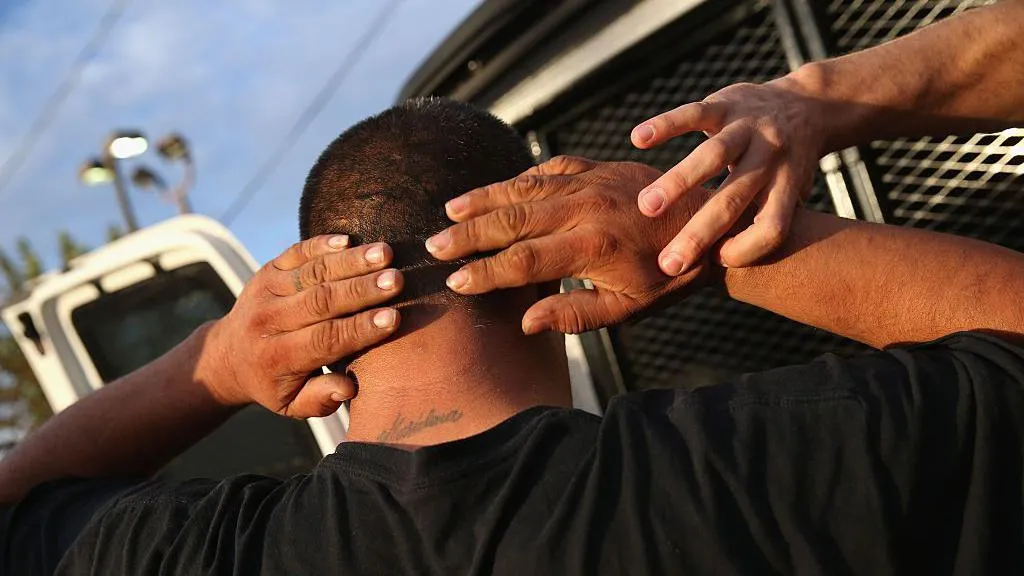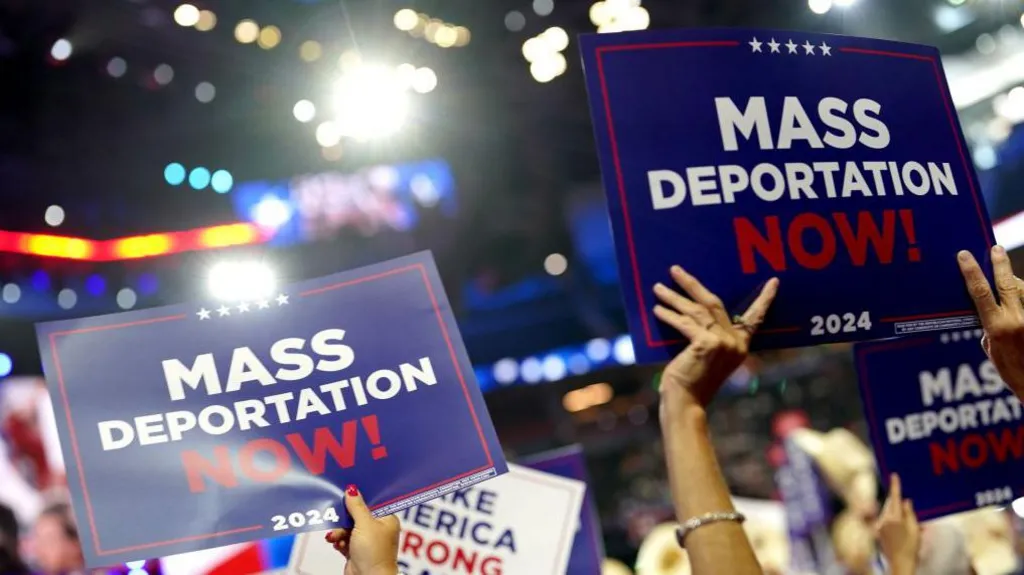 Donald Trump's team says that deportations will initially focus on public safety and national security threats.
Donald Trump's team says that deportations will initially focus on public safety and national security threats.Over two decades ago, Gabriela entered the United States, gasping for air under a pile of corn
stalks in the boot of a smuggler's car.
Today, the Bolivian national is a housekeeper in Maryland and one of at least 13 million
undocumented migrants living in the US, an umbrella term that includes those who entered the US illegally, overstayed their visas, or have protected status to avoid deportation.
Across the US, people like Gabriela wonder what the promise of the incoming Trump administration to enforce mass deportations may mean for their future.
It was a topic of heated discussion in undocumented immigrants' communities, WhatsApp groups, and social media over a dozen interviews.
Some, like Gabriela, think it won't affect them at all.
"I'm not scared at all, actually," she said. "That's for criminals to worry about. I pay taxes, and I work."
"In any case, I'm undocumented," she added. "[So] how would they even know about me?"
In perhaps the most explicitly anti-immigrant campaign in memory, immigration ranked foremost in the minds of US voters. And yet, nearly two weeks after his sweeping election win, it remains unclear what Trump's enforcement operations entail.
He frequently pledged to deport migrants en masse from US soil from his first Day in office if he were to return to the presidency.
The president-elect has assured cost will not be a factor, but experts have warned that his plans may pose big financial and logistical challenges.
His newly announced "border tsar," Tom Homan, said that those undocumented migrants deemed national security or public safety threats would be targeted first. He hinted that workplace raids, a policy ended by the Biden administration, might resume.
In a Fox News appearance Saturday, the former acting director of Immigrations and Customs Enforcement during Trump's first term challenged the notion that "those who enforce the law are the bad guys, and those who break the law are the victims."
"Who's the member of Congress, governor, or mayor who opposes removing public safety threats from their community?" he asked, promising the new administration would "follow through on the mandate that the American people gave President Trump."
Five takeaways from Trump's first week
'It's simple, really' - why Latinos flocked to Trump's working-class coalition.
Migrants, of course, are no strangers to the forced deportations of U.S. authorities. More than 1.5 million have been expelled under President Joe Biden, current and prior estimates suggest, along with millions who were rapidly turned away from the border during the Covid-19 pandemic.
Three million were deported during the eight years of Barack Obama's administration, whose critics dubbed the "deporter-in-chief." That focused on men, mainly from Mexico, who were easily deported from border states.
The plans unveiled by Trump, however are much broader and more aggressive, including inside the US, miles from the border, enforcement operations. Officials reportedly are considering using National Guard troops, and military aircraft to detain, then deport people.
Running mate, and incoming vice-president JD Vance said deportations could "start" with one million people.
But many of those undocumented immigrants think they might be better off with a Trump presidency than with being deported.
"Many Latinos, those who can vote, did it because they think he [Trump] can improve the economy. That would be very good for us, too," said Carlos, an undocumented Mexican who lives in New York City. His son is a US citizen.
According to the American Immigration Council, an independent organization that conducts research and speaks out for an overhaul of US immigration policy, there are more than five million Americans born to undocumented parents who have the security of US citizenship.
Carlos said he is "a little" afraid of getting swept up in immigration raids, but that fear is tempered by the possibility of an improved economy under Trump and more work.
"Things may be a little tight in our communities right now, but being worried isn't a solution," he said. "The best thing to do is avoid problems and not commit crimes."
 Promises of mass deportations formed a crucial part of Donald Trump's 2024 electoral campaign - and featured heaving at the Republican National Convention in July.
Promises of mass deportations formed a crucial part of Donald Trump's 2024 electoral campaign - and featured heaving at the Republican National Convention in July.Many others do not share this optimism and live in fear.
Among them is California resident Eric Bautista, a so-called "Dreamer," who benefits from a longstanding program that protects from deportation those who were brought illegally into the US as children.
At 29, Mr Bautista has only fleeting memories of life in Mexico, where he was born and left when he was seven.
For four years now, he has taught US history to high schoolers-school-and details about how waves of immigrants from Italy, Ireland, China, Japan, and Mexico settled in the country, only to face xenophobia.
"I don't think I have ever felt this way, even after more than 20 years here," said Mr Bautista in an interview with the BBC. "It feels like we're at a turning point, a new wave of nativism like those I teach about.
"It's just a future of fear and uncertainty for us."
Advocates and legal experts said there was no assurance that undocumented migrants without criminal convictions would not be caught in ramped-up deportation efforts.
In response, Aaron Reichlin-Melnick, director for policy at the American Immigration Council, predicted an increase in "collateral arrests," a term that emerged from the first Trump administration to describe immigrants swept up during enforcement actions, even though they may not have been the intended targets.
"Let's say they go after someone with a criminal record, and that person lives in a house with four other [undocumented] people," he said. "We saw with the first Trump administration, they'll arrest those people as well."
How would Trump's promise of mass deportations of migrants work?
Homan was asked about a hypothetical situation in which a grandmother got caught up in a "targeted" enforcement operation going after criminals, during a recent interview with CBS, the BBC's US partner.
When asked would she be deported, Homan replied: "It depends."
"Let the judge decide," he said. "We're gonna remove people that a judge's order deported."
Such collateral arrests could be arrested and potentially removed, quite a dramatic shift from the Biden administration that has focused on public safety threats and removing people shortly after their apprehension at the border.
While Homan has recently dismissed rumors that there would be "a mass sweep of neighborhoods" or other large detention camps, the shares in companies likely to help build detention centers have risen by as much as 90% since the election. Those include publicly traded prison firms GEO Group and CoreCivic.
Undocumented migrants work throughout the US economy- in agricultural fields, warehouses and construction sites, among others.
Mr Reichlin-Melnick said operations targeting such workplaces could lead to "indiscriminate" detentions.
"I don't think that being a person with no criminal record [who] pays taxes protects anybody," he said. "One of the first things that Trump will do is eliminate the Biden administration's enforcement priorities. And we've seen that when there are no priorities, they will go after whoever are the easiest targets."
That possibility has kept many migrants-including those from families with a mixed
legal status-on edge. Their most profound fear is being separated.
Brenda is a 37-year-old "Dreamer" from Mexico, protected from deportation in Texas.
Her husband and her mother aren't.
Her two children were born in the US and are American citizens.
When Brenda told the BBC she does not believe "good people" should be removed
first, she can't help but think about her husband returning to Mexico.
"As important as it is for us to see our sons grow up, of course the thought of being
separated leaves one frightened," she said.


0 Comments